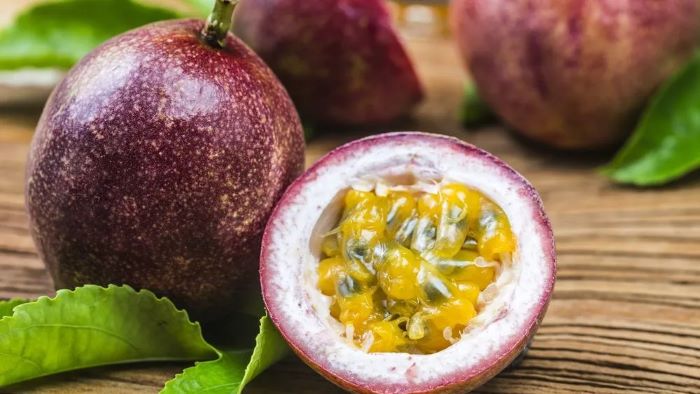Generally, fruits are great treats for dogs and also great alternatives to the packed treats available in the market. Due to this reason, you may consider feeding your dog fruits of all types. But wait are all fruits safe for them or are there some fruits toxic to dogs?
Being a pet parent this question might be frequently popping into your mind. So here in this blog, we will provide you with information on one such fruit, passion fruit.

Passion fruit which has several health benefits for humans, can it serve the same benefits to dogs too. Is it safe for them to consume all such questions answers will be provided through this blog.
What Is Passion Fruit?
Passion fruit[1] unpopularly also known as Passiflora edulis originated in Brazil’s southern area and now can be seen growing in South Africa, Australia, New Zealand, India and Hawaii
Passion fruit, the name itself generates curiosity. Available in green, purple and red colour, passion fruit is a juicy fruit with yellow pulp and around 250 black seeds in it.
The size of passion fruit generally ranges from 1.5 to 3 inches and is known by various names in various places. It has a firm interior and is neither in a complete solid nor liquid state.
Passion fruits taste like a blend of sour and sweet flavour. However, its taste varies according to its colour.
Risks of Passion Fruit for Dogs
Here are some of the risks of passion fruit for dogs:

Allergic reactions:
Passion fruit may trigger allergy in your dog. It is not suitable for all dogs and may lead to difficulty in breathing, gastrointestinal issues, and swelling.
Choking:
The seeds of passion fruit being hard, can lead to choking and even get stuck in the intestine of your dog. It can lead to blockage in the stomach and may require surgery to remove it.
Cyanide poisoning:
The seeds of passion fruit have higher cyanide content and can lead to cyanide poisoning. This may have an adverse effect on your dog’s health
According to Dr. Hanie Elfenbein, DVM, in petmd, "Cyanide toxicity can be deadly in only a few minutes. If only a small amount is consumed, signs of cyanide toxicity include salivation, rapid or difficulty breathing, and even convulsions and paralysis."
High sugar:
The flesh of passion fruit is only an eatable part of it for dogs. However, it also has high sugar content which is not safe for dogs. If it is fed in excessive amounts, your dog may suffer from diarrhoea and vomiting.
These risks make it clear why feeding your husky the best dog food for huskies is so important.
Symptoms of Passion Fruit Poisoning
Passion fruit is not safe for dogs and has higher risks associated with it, if you still feed your dog passion fruit or he consumes it mistakenly look for the following symptoms:

- If your dog consumes passion fruit, there are higher chance he may vomit out the consumed part. You may even spot blood, foam or bile in the vomit, which signals the passion fruit poisoning.
- Another symptom of passion fruit poisoning is swelling. After eating the passion fruit your dog have swelling on the face, mouth and throat.
- Your dog may suffer from breathing difficulty due the cyanide poisoning and swelling in the throat.
- He may even suffer from anaphylaxis a dangerous allergic reaction in which the immune system releases chemicals lowering the blood sugar.
- Muscle spasms are common in dogs due to cyanide poisoning and psychoactive alkaloids which affects the brain and nervous system[2] of dog.
- The red mucous membrane of a dog which includes his gum, nose and eyes may turn blue due to lack of oxygen in them.
Safer Alternatives of Passion Fruit
As passion fruit serves no good purpose for your dog, you should avoid feeding it your dog. There are several alternatives available for passion fruit which have similar sweetness and tartness:

- Mango is rich in vitamin C and has a lot of antioxidant properties. It is the same for a dog to consume, you just have to remove its hardcore.
- Pineapple is rich in vitamin C, bromelain is a perfect replacement for passion fruit. It also contains enzymes which help in the digestion process.
- Guava contains a high content of vitamin C and fibre, it is very helpful in treating low blood pressure and cholesterol problems.
- Peaches are low in calories and sugar. They are good sources of potassium and vitamin A.
- Papaya has a high content of vitamin C and beta-carotene, which helps in easy digestion and treating inflammation.
These fruits are not only safer alternatives but also great sources of fiber. For more advice on boosting fiber in your dog's diet, check out our guide on, "how to add fibre to dogs diet uk?".
FAQs
How much passion fruit can my dog eat?
Though it is not safe to give your dog passion fruit as it has a lot of toxic factors related to it, if you still consider giving it then just give flesh of passion fruit. Make sure the fruit is ripe and you have removed all its seeds.
Is passion fruit bad for dogs?
Yes, passion fruit is toxic for dogs. The content of cyanide is higher in passion fruit which can lead to cyanide poisoning in dogs. However, dogs can eat the flesh of the fruit, but it too is high in sugar. Thus either way you should avoid giving your dog the passion fruit.
Can dogs eat passion fruit seeds?
No, dogs cannot eat passion fruit seed due to its high cyanide content. If your dog consumes the seeds of passion fruit then it may get stuck in his intestine and lead to cyanide poisoning. If the seed causes blockage then it may require surgery to remove it.
Can dogs eat passion fruit skin?
No, dogs cannot eat the passion fruit skin. Passion fruit is not good for dogs and so is its skin. Instead of giving your dog passion fruit, you can try other safer and nutritional fruit alternatives.
Is any part of a passion fruit poisonous?
All parts of passion fruit are poisonous except its flesh. You should avoid giving your dog passion fruit if you want him to live a happy and healthy life without any sort of discomfort.
Conclusion
As a pet parent, you may wish to provide your dog with varieties of food, especially fruits considering their health benefits. But it is necessary to always remain cautious owing to the fact that all fruits might not be safe for your dog.
Passion fruit is one such fruit which has more risks and should be avoided to feeding your dog. If your dog consumes it mistakenly consult a vet and seek medical help immediately.
Never try to experiment with different foods on your dog without proper knowledge. Doing so can not only reduce your dog’s health but also cause unnecessary discomfort.
While passion fruit should be avoided for dogs, many pet parents wonder - is jam bad for dogs too? With its high sugar content, jam poses similar risks and should also be fed sparingly, if at all
Reference:
- Passion fruit. (n.d.).
- Texas A&M Veterinary Medical Teaching Hospital – Texas A&M College of Veterinary Medicine & Biomedical Sciences. (2021, June 14). Central Nervous System Inflammation – Texas A&M Veterinary Medical Teaching Hospital. Texas a&M Veterinary Medical Teaching Hospital.



